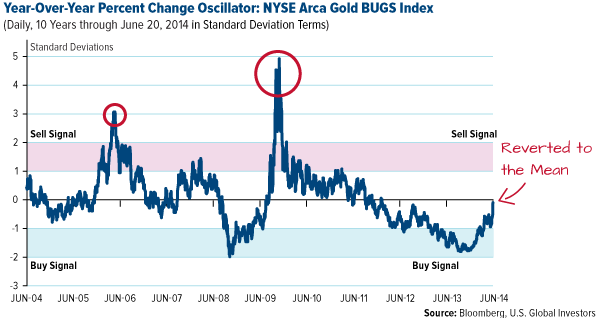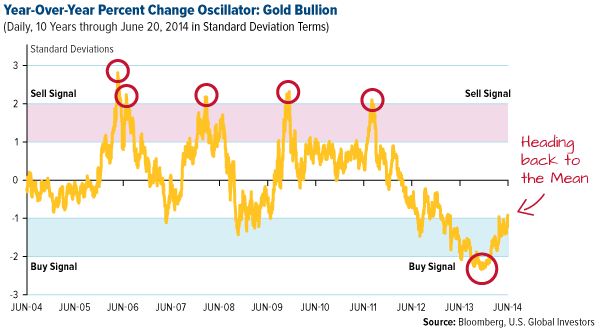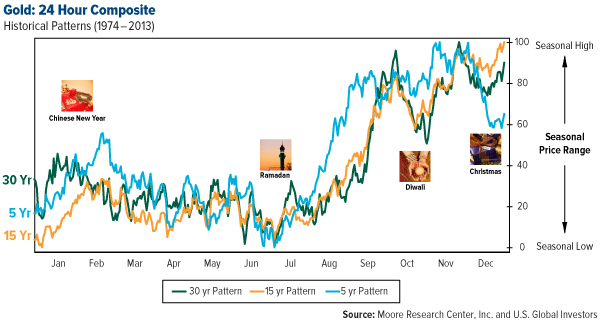With the price spike in gold this week (spot gold up nearly 3% and gold stocks up around 7%) some of the perpetual gold naysayers are suggesting the metal had shifted to overbought status but that just is not the case. Below I explain why gold has taken off.
perpetual gold naysayers are suggesting the metal had shifted to overbought status but that just is not the case. Below I explain why gold has taken off.
The above comments are edited excerpts from an article* by Frank Holmes (usgold.com) entitled Ah, the Power of Mean Reversion.
The following article is presented by Lorimer Wilson, editor of www.munKNEE.com (Your Key to Making Money!), www.FinancialArticleSummariesToday.com (A site for sore eyes and inquisitive minds) and the FREE Market Intelligence Report newsletter (register here; sample here) and has been edited, abridged and/or reformatted (some sub-titles and bold/italics emphases) for the sake of clarity and brevity to ensure a fast and easy read. This paragraph must be included in any article re-posting to avoid copyright infringement.
Holmes goes on to say in further edited excerpts:
Based on our historical observations, and the math of the markets, gold is not overbought but is simply:
- reverting to its mean and
- entering its seasonal up cycle, driven by cultural gold buying
1. Reversion to the Mean
Mean reversion has shown that eventually, both gold stocks and gold bullion will move back to their historical averages. Right now, as you can see from the chart below, gold stocks have seen a reversal to the long-term mean, but we are still waiting for gold bullion to do so as shown in the second chart.
Similarly, for gold bullion to reach overbought territory it would need another 20% move, and for gold stocks to be overbought they would need another 30% move.
There is always an emotional bias against gold, whether it is soaring high or dipping low, and that is why it’s important to manage these emotions when positioning a portfolio…Additionally, I remind investors that moderation is key when it comes to gold. Your exposure should be 5% to gold stocks and 5% to gold bullion, rebalancing annually.
2. Seasonality
Another reason that gold is moving is it’s beginning its seasonal cycle, driven by cultural gold buying. The demand of gold reflected over the next several months and characterized by the purchase of the metal for cultural celebrations and religious holidays, I refer to as the Love Trade.
If you look at the chart below, you will see that July marks the beginning of the Love Trade with the celebration of Ramadan followed by the Indian Festival of Lights, then the wedding season and, of course, Christmas.
This seasonal pattern is one of the most powerful drivers for gold demand.
Conclusion
Monitoring seasonality while remaining aware of other fundamentals to gold such as mean reversion and a prudent 10% portfolio weighting (5% in gold stocks and 5% in gold bullion, while rebalancing annually), are imperative to understand when investing in gold.
Editor’s Note: The author’s views and conclusions in the above article are unaltered and no personal comments have been included to maintain the integrity of the original post. Furthermore, the views, conclusions and any recommendations offered in this article are not to be construed as an endorsement of such by the editor.
*http://www.usfunds.com/investor-library/investor-alert/ah-the-power-of-mean-reversion/#.U6XEdlVOXIU (©2014 U.S. Global Investors, Inc. All Rights Reserved.)
Related Articles:
1. Get on Board – NOW! We’re On the Verge of a Major Bull Market Advance Across the PM Sector.
The charts below make it crystal clear that we are on the verge of a major bull market advance across the PM sector. While these charts are for the Market Vectors Junior Gold Miners ETF, what happens to the GDXJ has major implications for the whole sector, for the simple reason that it is not going up without the entire sector going up too. Read More »
2. Incredible Bounce Coming Soon In Gold & Silver – Here Are 5 Reasons Why
Get ready for an incredible bounce higher in the gold & silver junior miner sector. Here are five reasons why. Read More »
3. The Most Explosive Turnaround to the Upside — EVER — Is Coming In the Precious Metals Sector
I am 100% confident that 1) precious metals will bottom this year and resume a new leg to the upside, 2) the extreme emotions right now regarding gold and silver are typical at major turning points and 3) all the underlying fundamental, cyclical and technical conditions for a new bull market in gold and silver are in place. Here’s an update on the latest action in gold, silver, platinum and palladium Read More »
4. What Coming Negative Deposit Rates In U.S. Mean For Future of Gold & Silver & PM Mining Shares
Before this great financial crisis ever comes to a close, you’ll see the Federal Reserve copy Europe and also implement negative deposit rates to try and get commercial banks to lend money into the economy. I have absolutely no doubt about it – and it will have three chief consequences for the markets. Let me explain. Read More »
5. Would Gold & Silver Stocks Be Affected By Major Decline In S&P 500?
Should gold stock investors and speculators worry about the effect of a decline or cyclical bear market of the S&P 500 on the mining sector? You’ll be surprised at the answer! Read More »
6. Here’s How to Choose Gold & Silver Stocks With the GREATEST Chance of Major Returns
Which gold/silver mining companies own quality undeveloped gold and silver deposits in safe stable countries – and are extremely well managed? Such companies offer exceptional value in that they provide the best exposure to a rising precious metals price environment. Below are a number of things to look for when considering an investment in such companies. Read More »
7. Gold Stocks Could Jump 100% in the Coming Year – Here’s Why
It’s not crazy to think that gold stocks could easily double from their current levels if you realize the extreme condition the gold-stocks-to-gold ratio is in – and if you know your market history. Let me explain. Words: 336; Charts: 1 Read More »
Stocks are pulling back in preparation for one final mind-blowing surge to top off this five-year bull market. Gold, on the other hand, looks like it is setting up for a final bear market capitulation phase where every gold bug finally throws up their hands in disgust and jumps over to the stock market right as it’s putting in a final bubble top. For those…that are sitting in cash, this final capitulation is going to represent one of the greatest buying opportunities of this generation. Read More »
How much capital has the management team taken out of their pockets and put directly into the company? What amount of shares of a company are owned by funds or big financial institutions. The extent of such ‘skin in the game’ and ‘smart money’ involvement is crucial in deciding whether or not to invest in a particular company. Here’s why. Read More »
90% of the management teams you interview will be unable to present a reasoned argument for pursuing their project and to justify the approach they are using so let’s examine Rick Rule’s 11 “must ask” questions, one by one. Read More »
11. Gold Stocks: What Can We Expect in 2014?
After three years of pain, can gold stocks break their losing streak and see a gain in 2014? History says the chances are good. Here’s why that is the case. Read More »
 munKNEE.com Your Key to Making Money
munKNEE.com Your Key to Making Money






As goes Gold also goes Silver, maybe even leading the way, especially if percentages are considered.